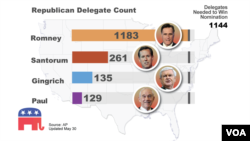HOUSTON, Texas - Republican presidential candidate Mitt Romney has clinched his party's presidential nomination after winning the Texas primary Tuesday. The primary drew little national attention, however, because Romney's main rivals had dropped out of the contest.
Romney clinched the Republican presidential nomination with little fanfare in a contest that was really no contest at all. The former Massachusetts governor needed only 58 of the lonestar state's 152 delegates to reach the 1,144 needed to win the nomination. Romney did not visit Texas in the days before the primary vote and spent Tuesday campaigning in two states that could be close in November, Nevada and Colorado.
But many Texas voters came to the polls to support local and state candidates, giving little notice to the Romney effort to wrap up the nomination here. One Montgomery County voter, who called himself Johnny, says he voted because he is not happy with any of the people who hold office now.
"I just want some change," he said. "These people who have been in there for so many years, I would like to give some other people a chance to make some changes because I don't like the way things are going right now."
Discontent with established political leaders drove many Texas voters to back former state solicitor-general Ted Cruz. He hopes to win the Republican nomination for the Senate seat being vacated by Kay Bailey Hutchison, who is retiring. Cruz had backing from some Tea Party groups and some national conservative figures like former Alaska Governor Sarah Palin.
Party leaders, including Texas Governor Rick Perry, back Lieutenant Governor David Dewhurst. He has also counted on support from national conservative figures like former Arkansas governor and presidential candidate Mike Huckabee. Cruz and Dewhurst will face each other in a run-off.
The Dewhurst-Cruz clash echoes other recent contests around the country in which candidates seen as representing the political establishment have been challenged by candidates claiming to be more conservative. Earlier this month, Republican Senator Richard Lugar lost the Indiana primary race to state Treasurer Richard Mourdock, who was a Tea Party favorite. Lugar, who has held the Senate seat since 1977, was portrayed as being out of touch with the state he represents and too willing to compromise with Democrats.
Mitt Romney faced similar attacks in his long fight for the nomination, with several candidates running to his right and criticizing his record as governor of Massachusetts, from 2003 to 2007. In trying to defend his conservative convictions, Romney took positions that many analysts say may put him at a disadvantage running against President Barack Obama, a Democrat, in the November election, when more moderate, independent voters will likely hold more sway. But those same analysts say the election is likely to be decided on the question of which candidate can better address economic concerns and create jobs. With the election still five months away, both Romney and President Obama are raising funds and developing campaign strategies, in an effort to present their separate cases on that crucial issue.
Romney clinched the Republican presidential nomination with little fanfare in a contest that was really no contest at all. The former Massachusetts governor needed only 58 of the lonestar state's 152 delegates to reach the 1,144 needed to win the nomination. Romney did not visit Texas in the days before the primary vote and spent Tuesday campaigning in two states that could be close in November, Nevada and Colorado.
But many Texas voters came to the polls to support local and state candidates, giving little notice to the Romney effort to wrap up the nomination here. One Montgomery County voter, who called himself Johnny, says he voted because he is not happy with any of the people who hold office now.
"I just want some change," he said. "These people who have been in there for so many years, I would like to give some other people a chance to make some changes because I don't like the way things are going right now."
Discontent with established political leaders drove many Texas voters to back former state solicitor-general Ted Cruz. He hopes to win the Republican nomination for the Senate seat being vacated by Kay Bailey Hutchison, who is retiring. Cruz had backing from some Tea Party groups and some national conservative figures like former Alaska Governor Sarah Palin.
Party leaders, including Texas Governor Rick Perry, back Lieutenant Governor David Dewhurst. He has also counted on support from national conservative figures like former Arkansas governor and presidential candidate Mike Huckabee. Cruz and Dewhurst will face each other in a run-off.
The Dewhurst-Cruz clash echoes other recent contests around the country in which candidates seen as representing the political establishment have been challenged by candidates claiming to be more conservative. Earlier this month, Republican Senator Richard Lugar lost the Indiana primary race to state Treasurer Richard Mourdock, who was a Tea Party favorite. Lugar, who has held the Senate seat since 1977, was portrayed as being out of touch with the state he represents and too willing to compromise with Democrats.
Mitt Romney faced similar attacks in his long fight for the nomination, with several candidates running to his right and criticizing his record as governor of Massachusetts, from 2003 to 2007. In trying to defend his conservative convictions, Romney took positions that many analysts say may put him at a disadvantage running against President Barack Obama, a Democrat, in the November election, when more moderate, independent voters will likely hold more sway. But those same analysts say the election is likely to be decided on the question of which candidate can better address economic concerns and create jobs. With the election still five months away, both Romney and President Obama are raising funds and developing campaign strategies, in an effort to present their separate cases on that crucial issue.





